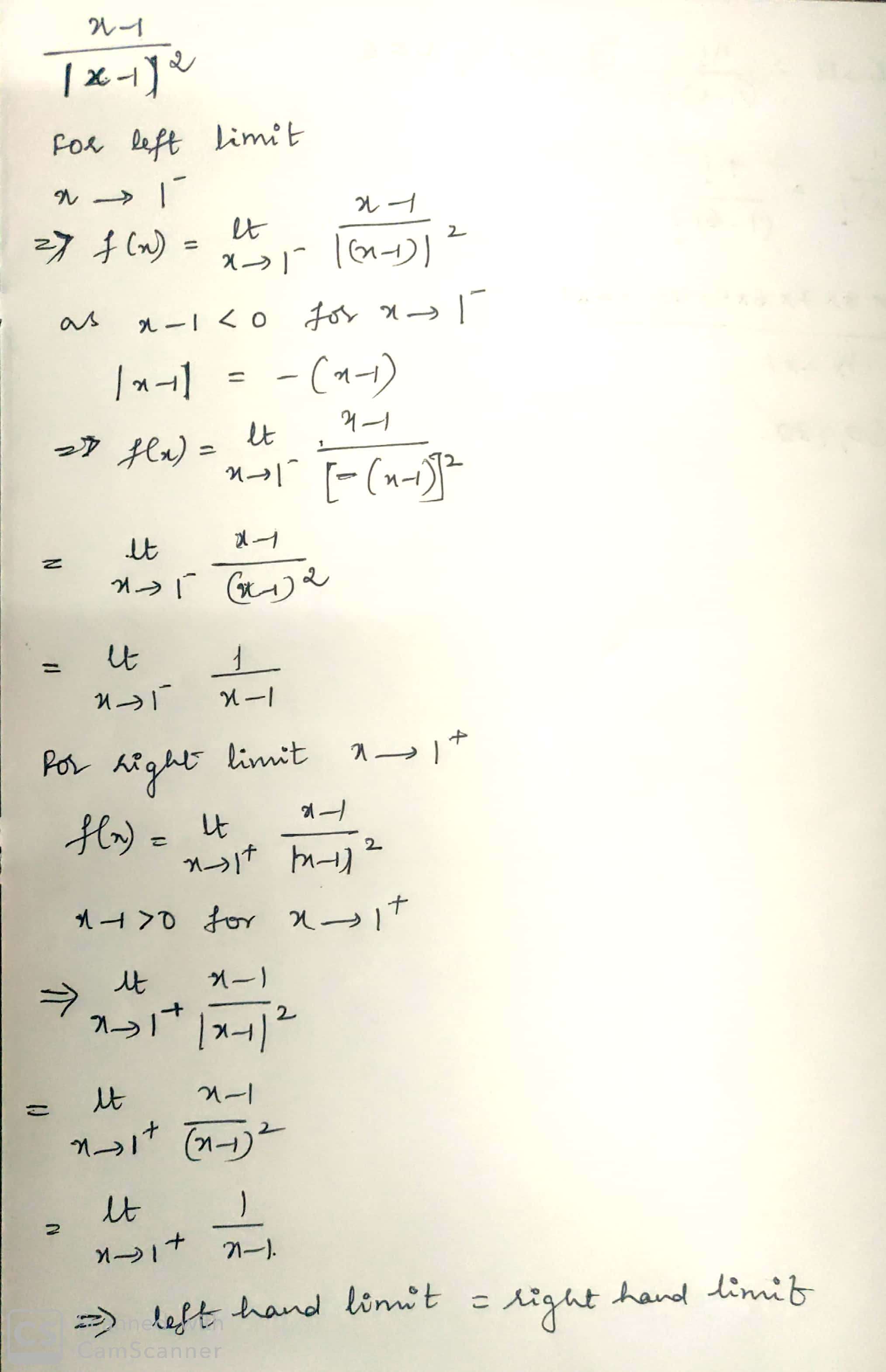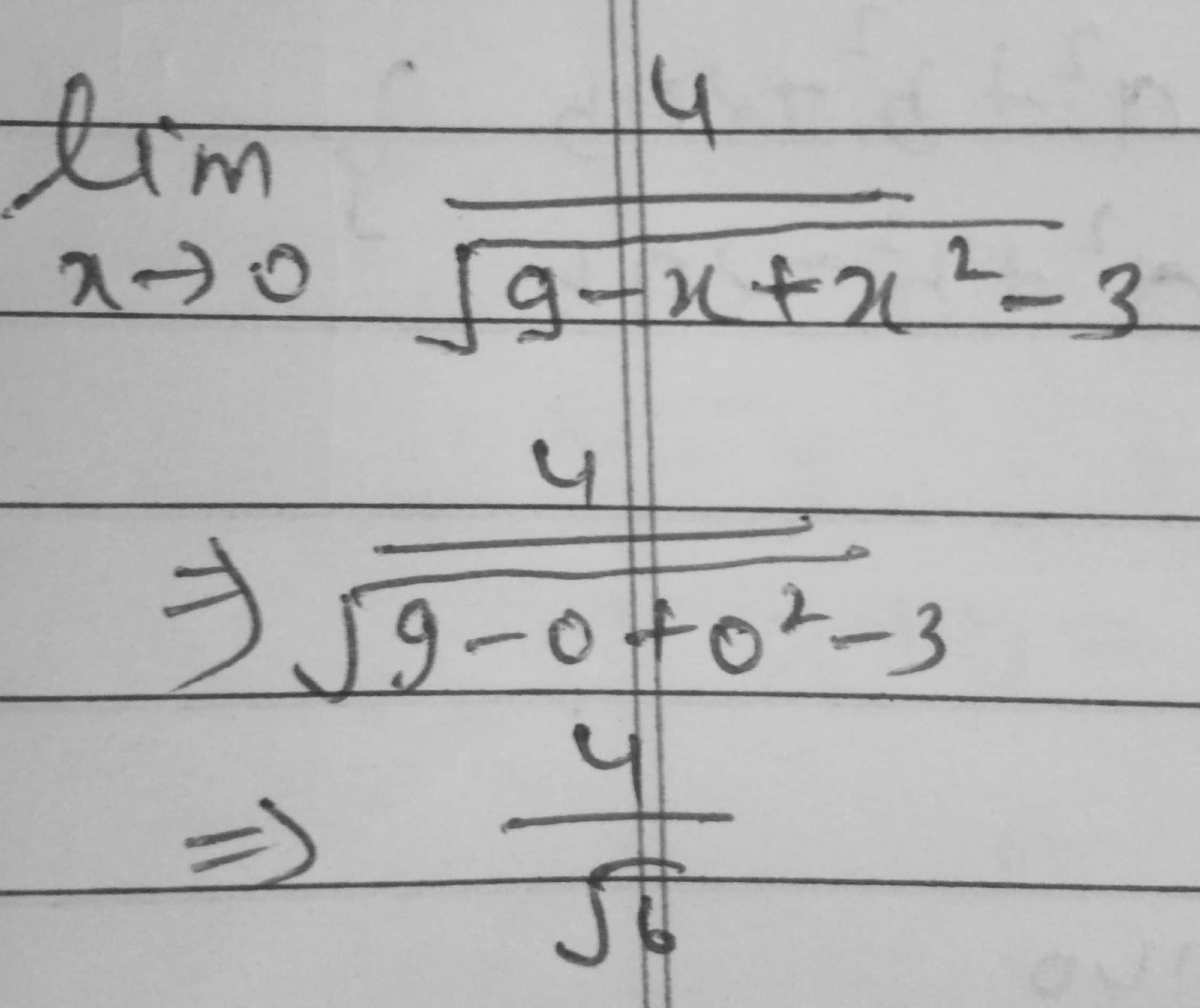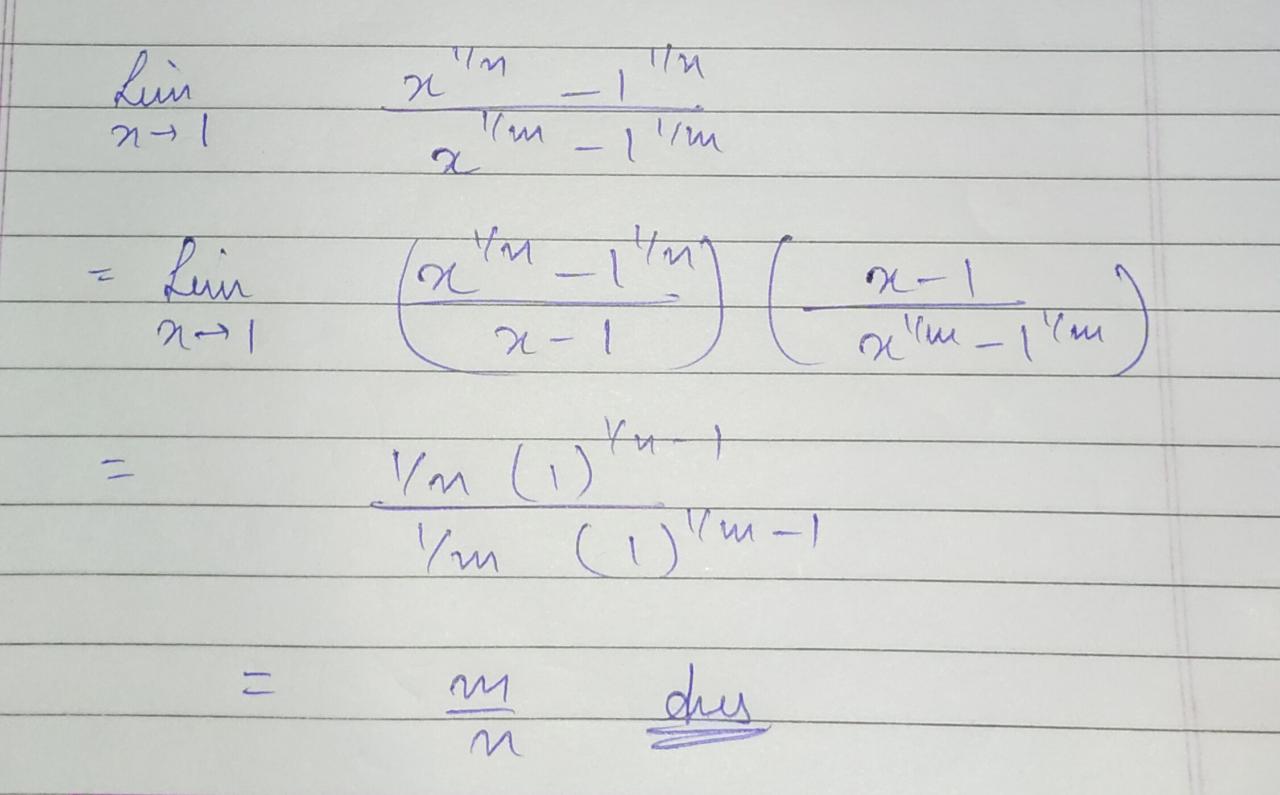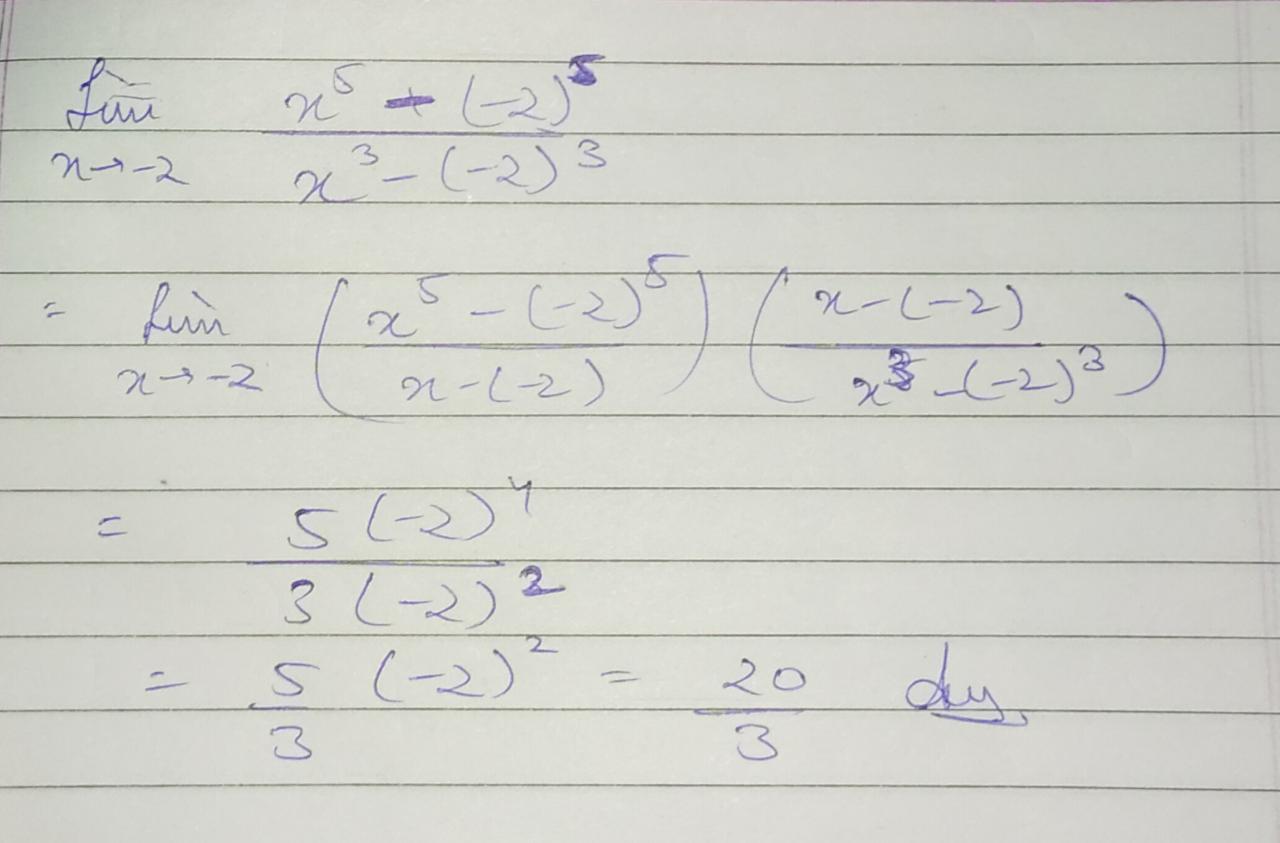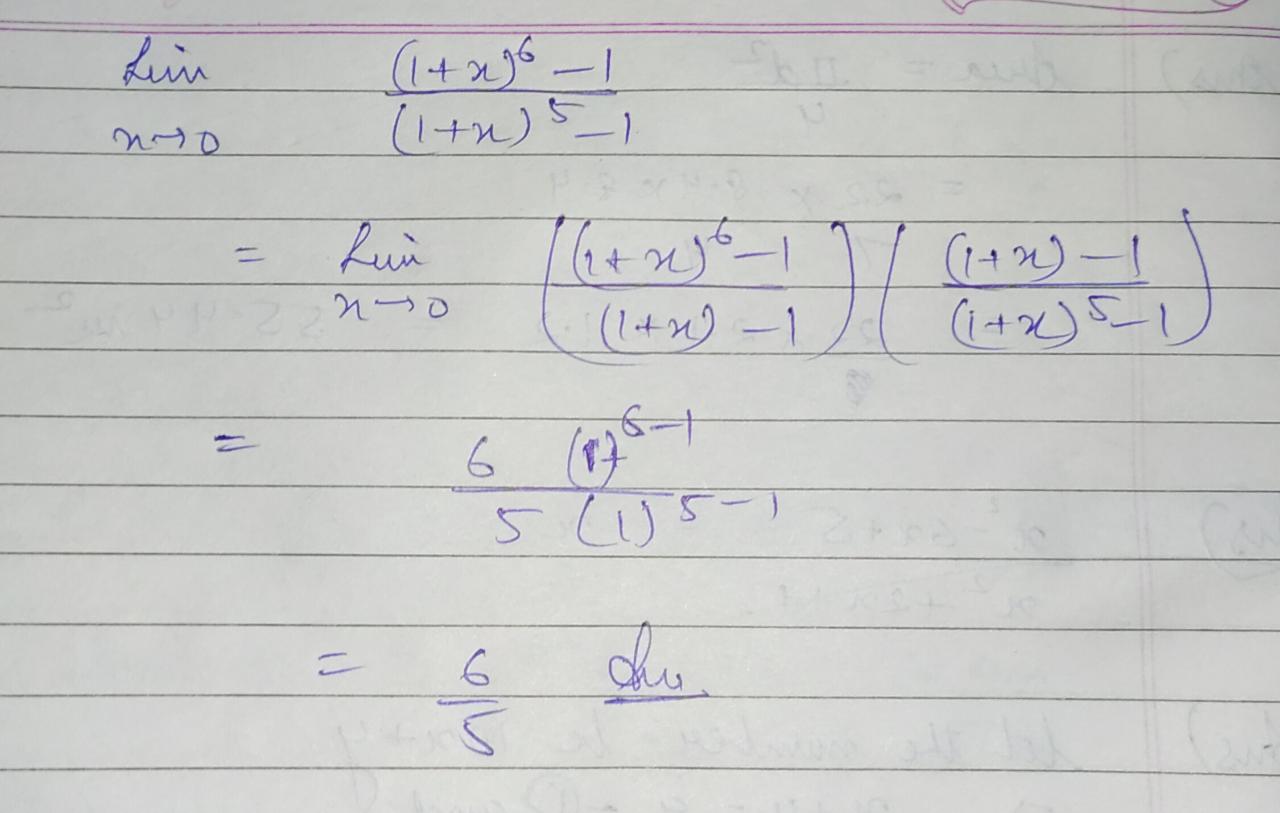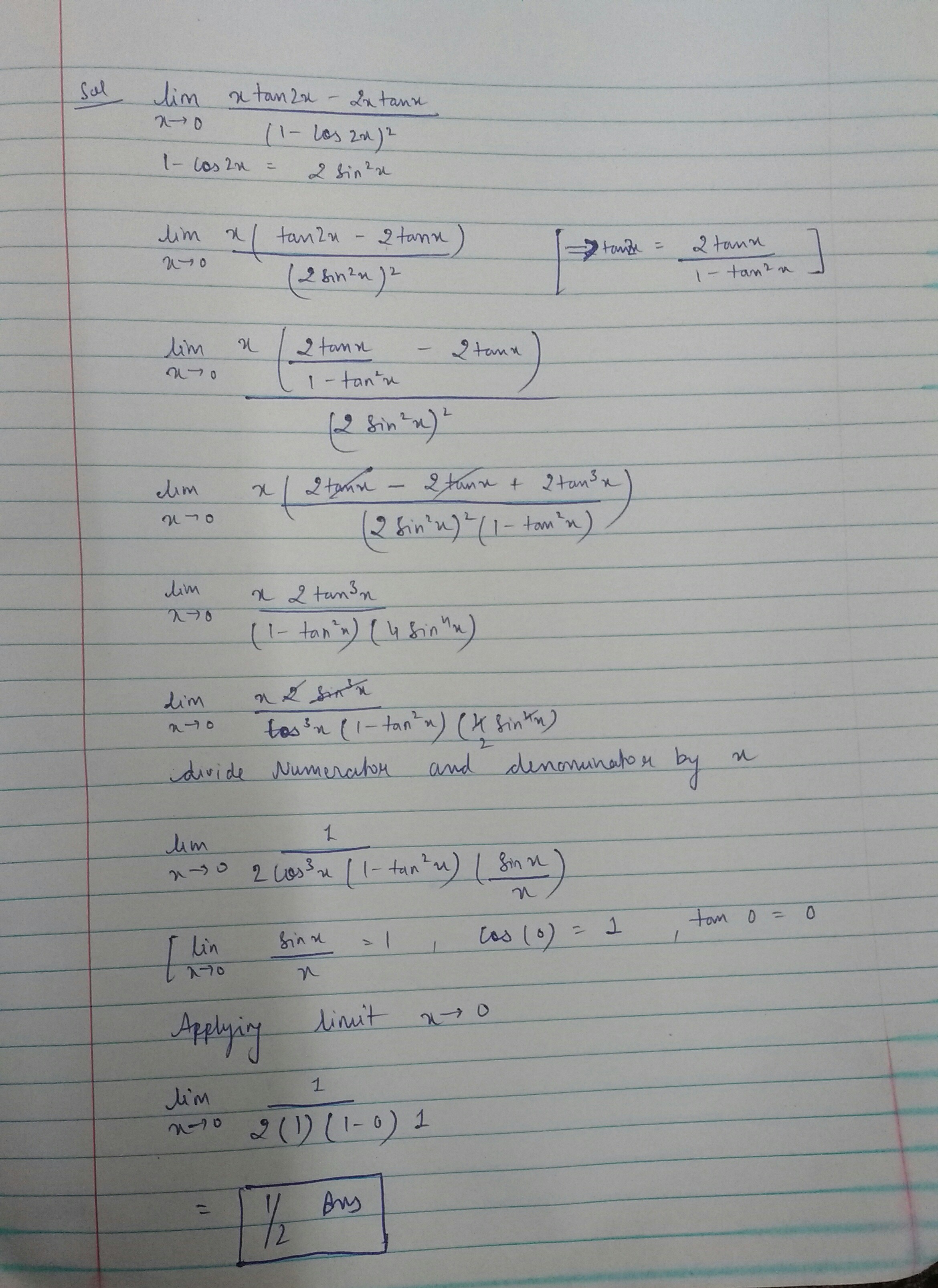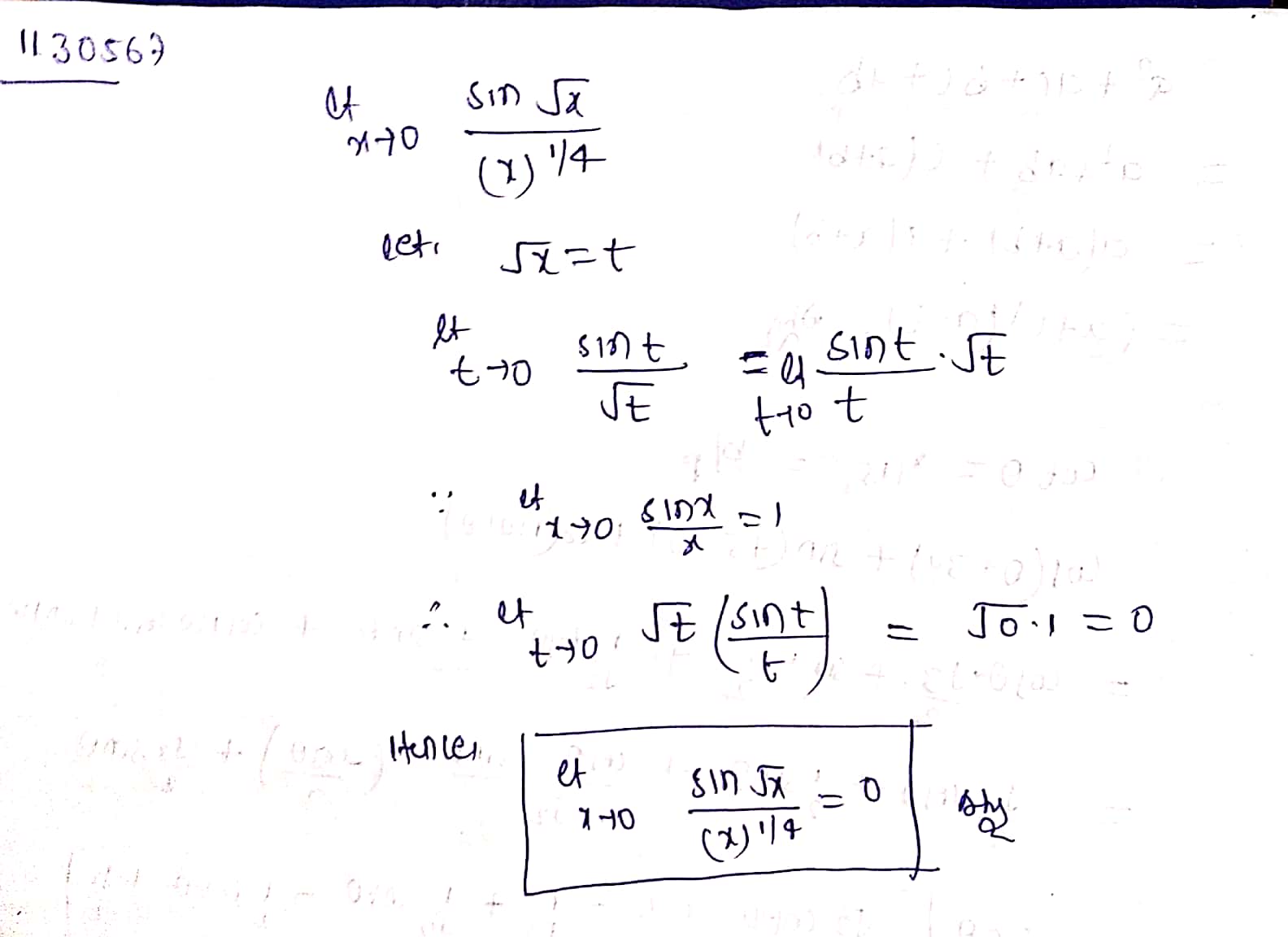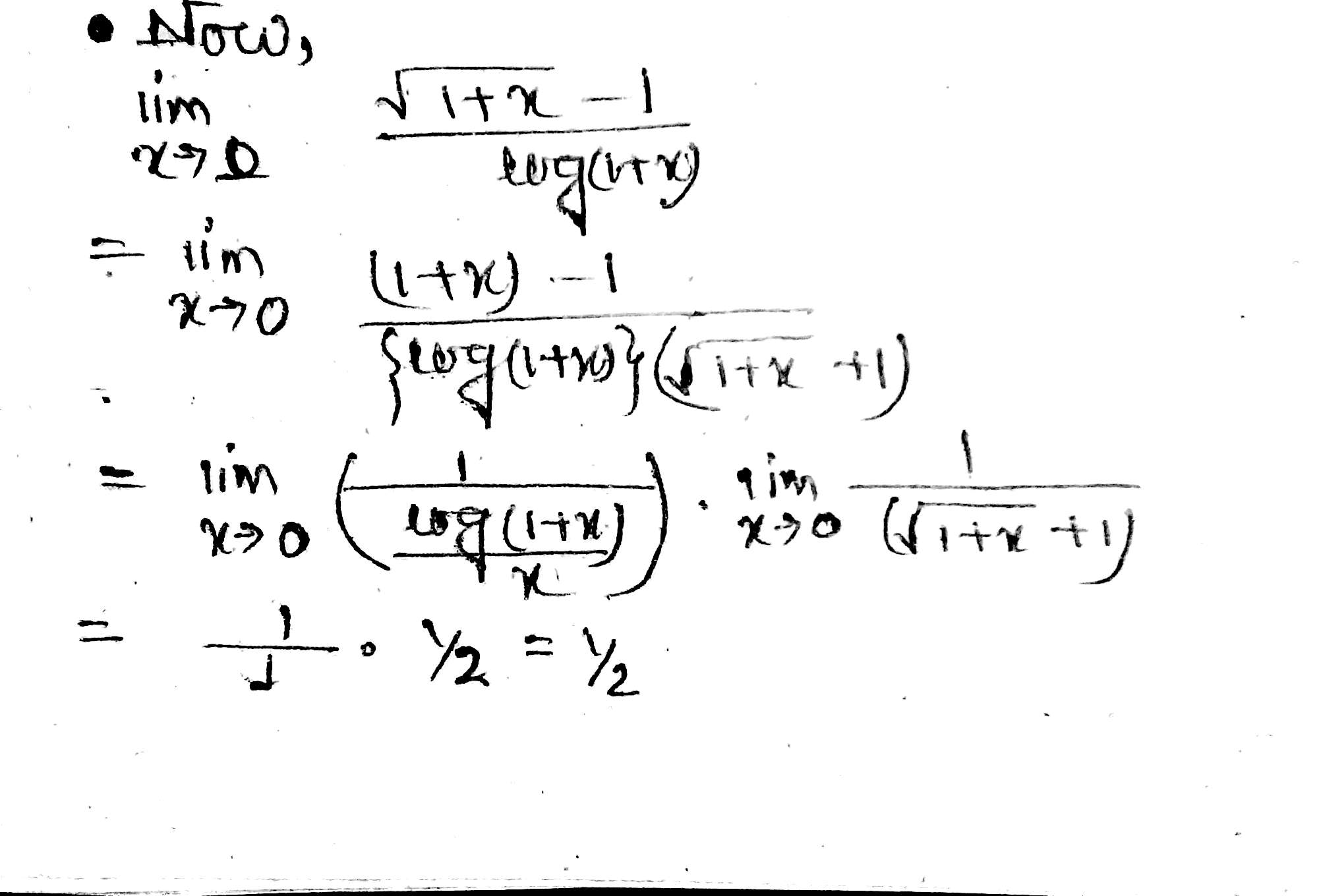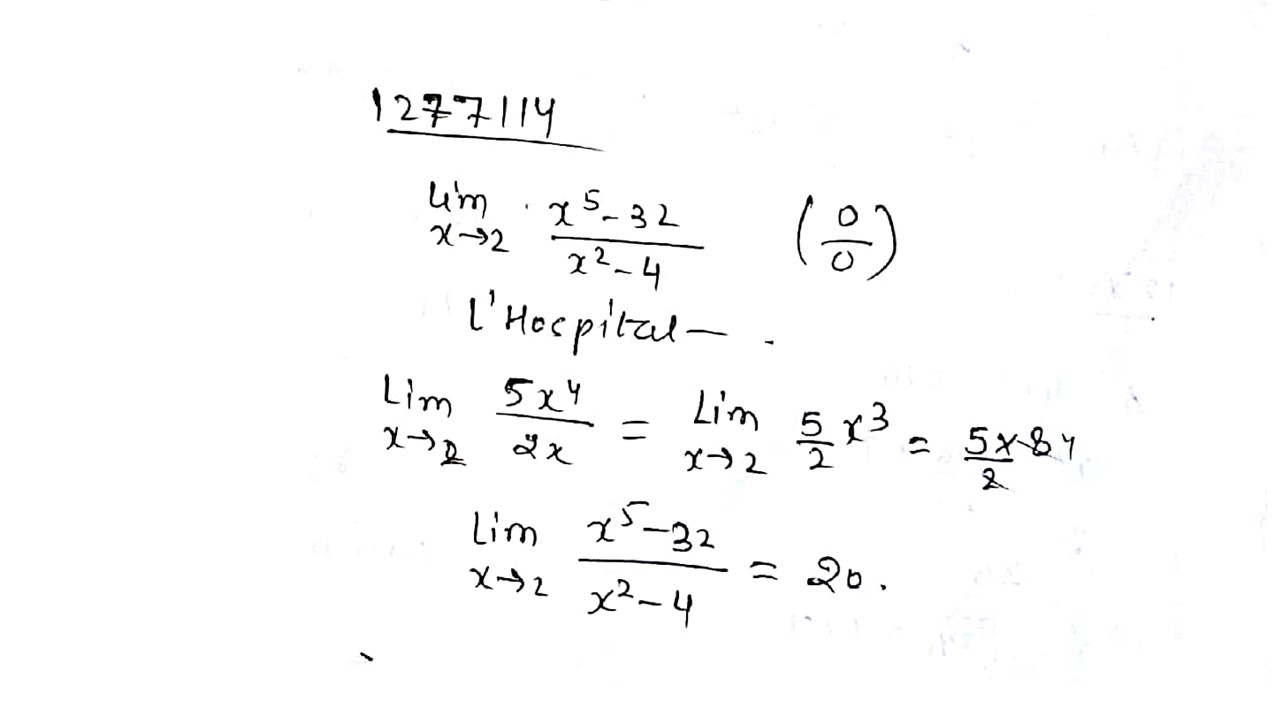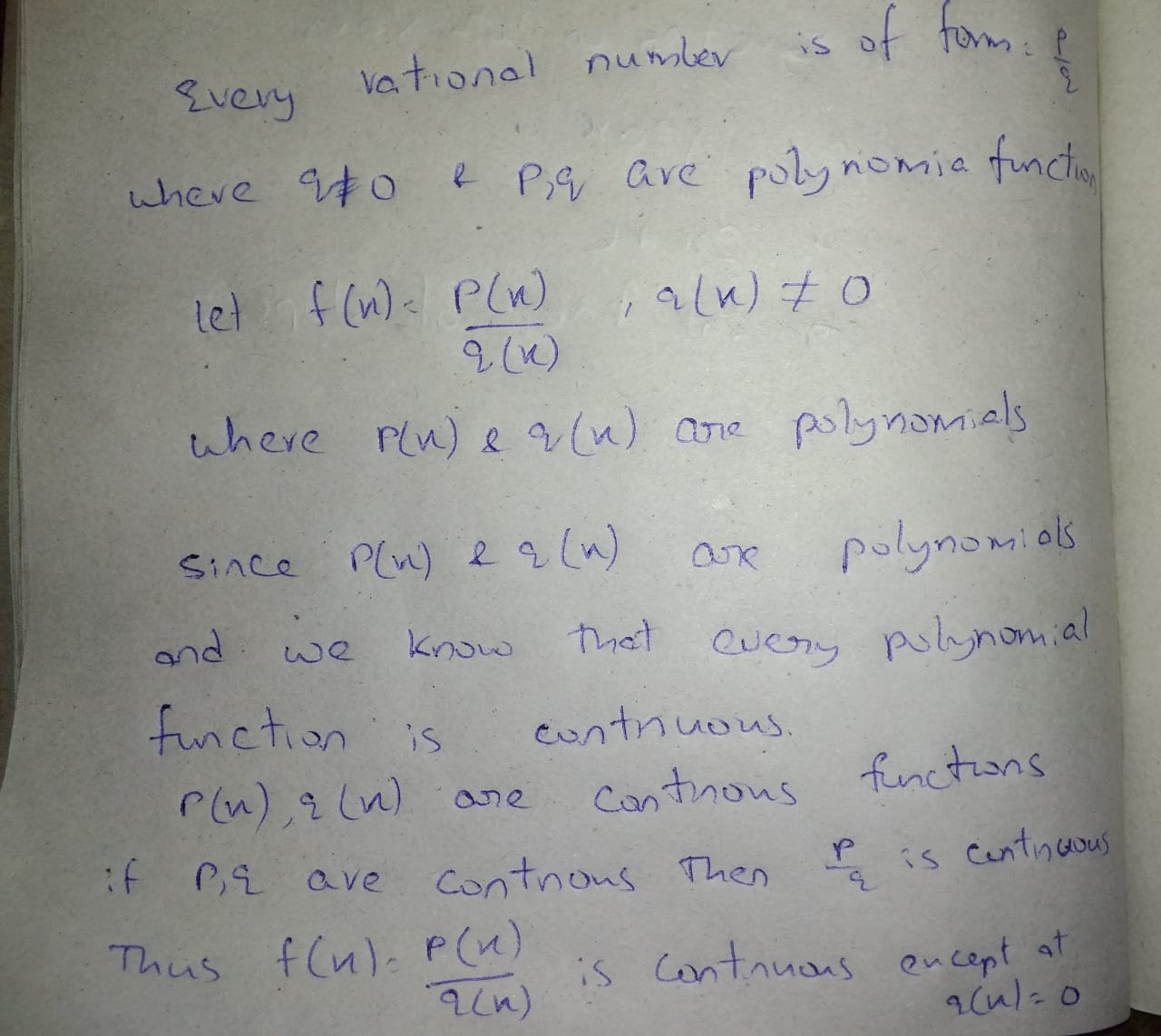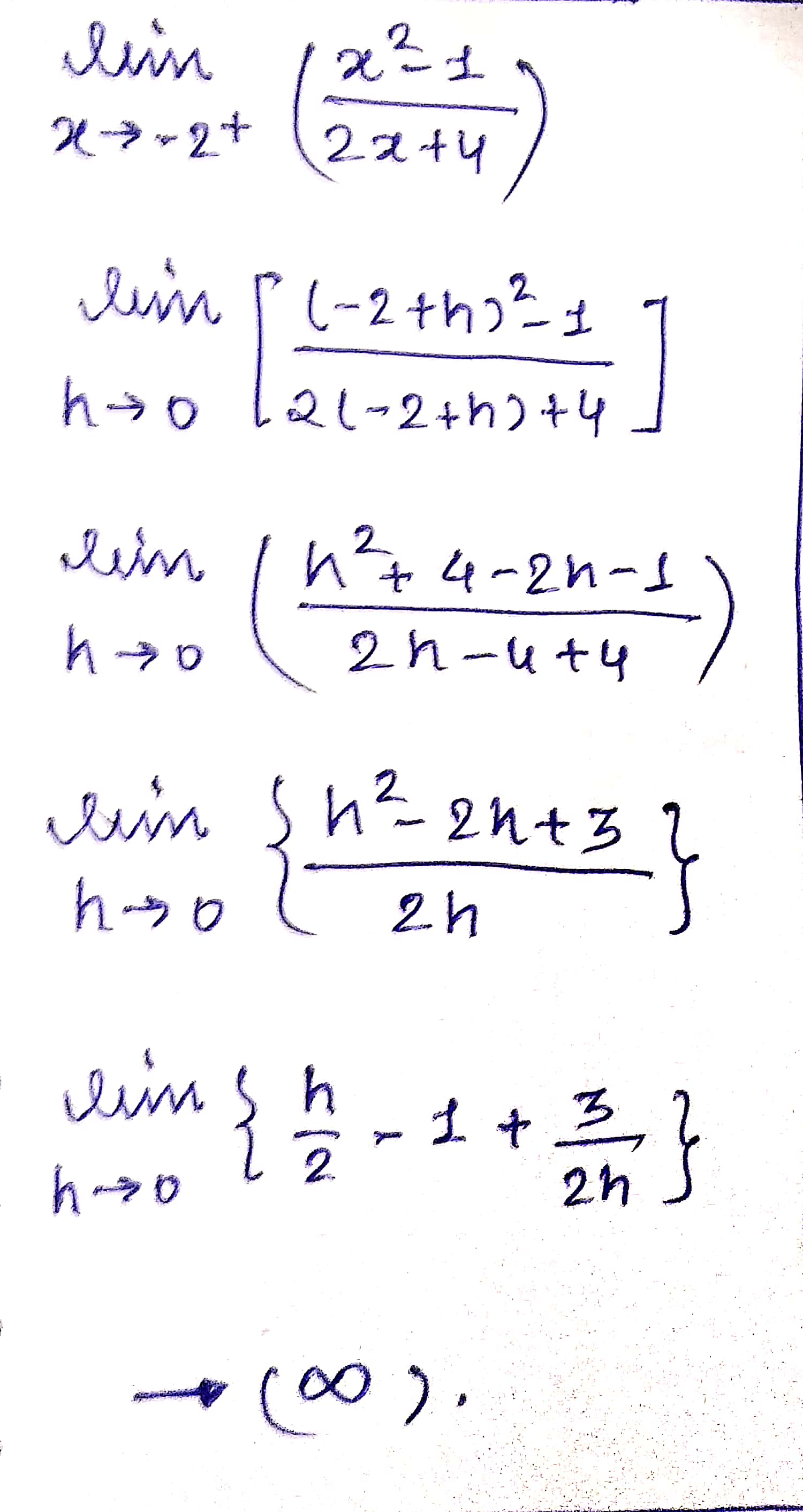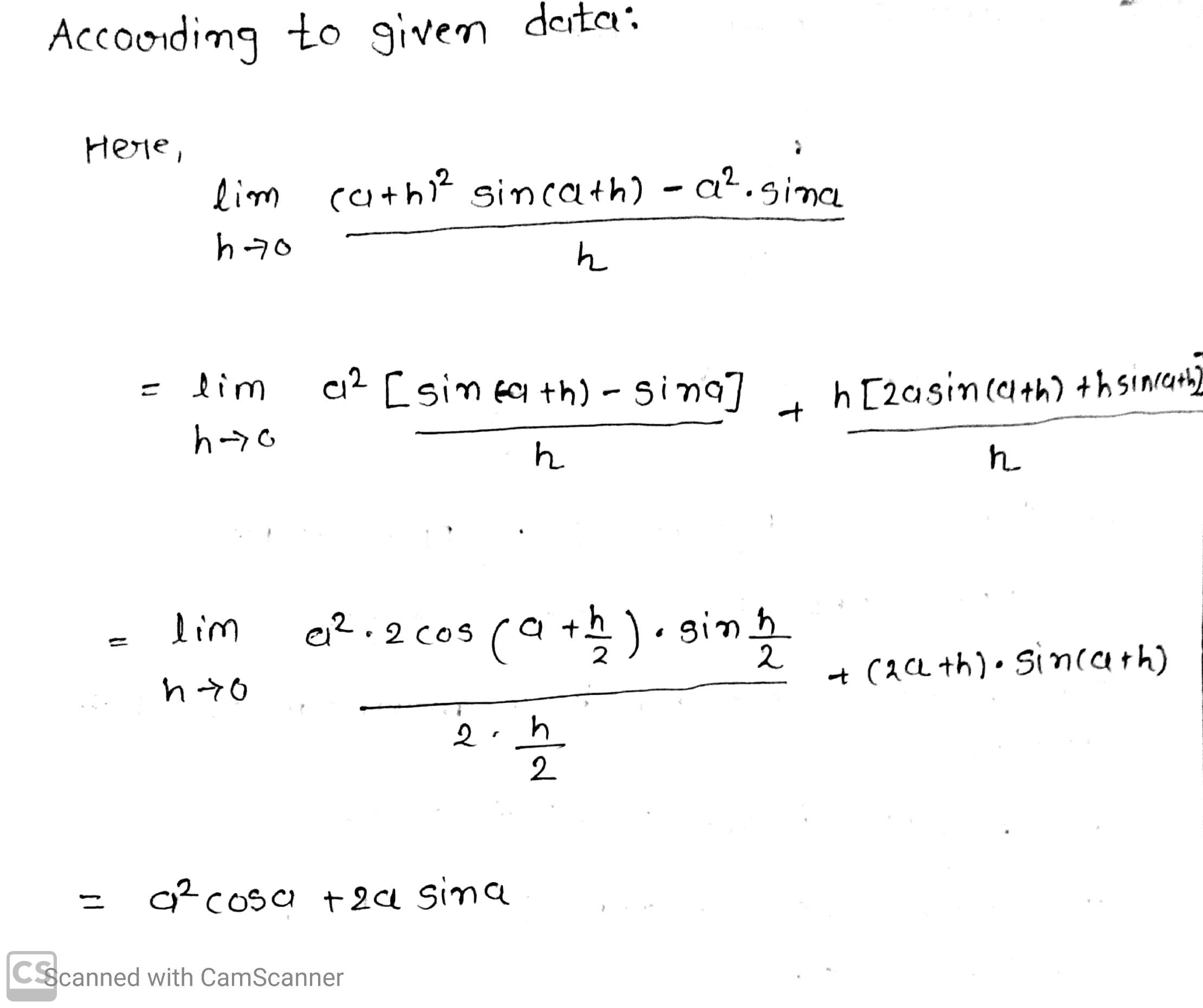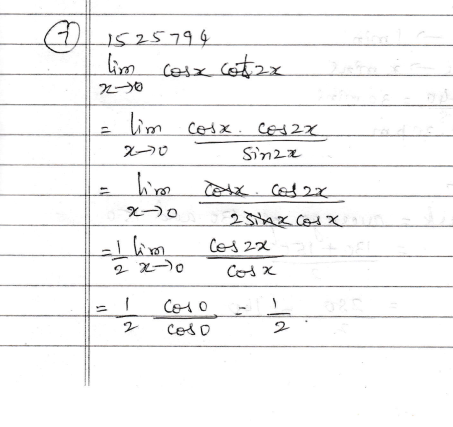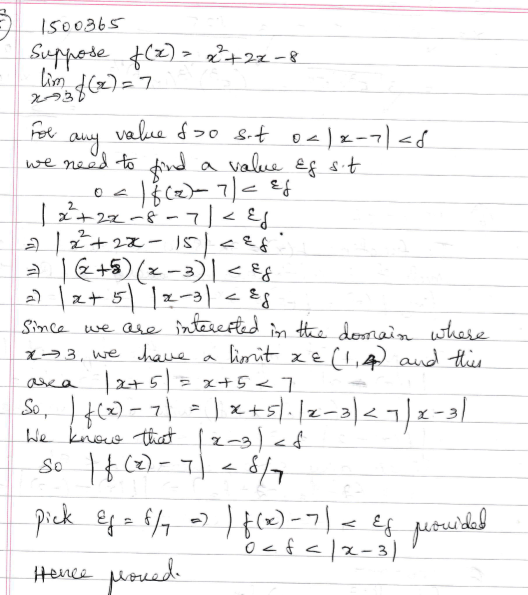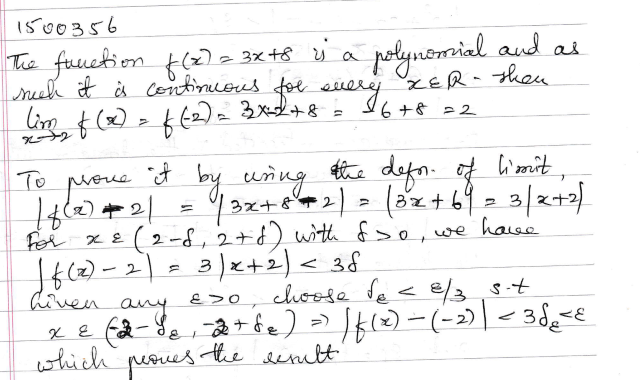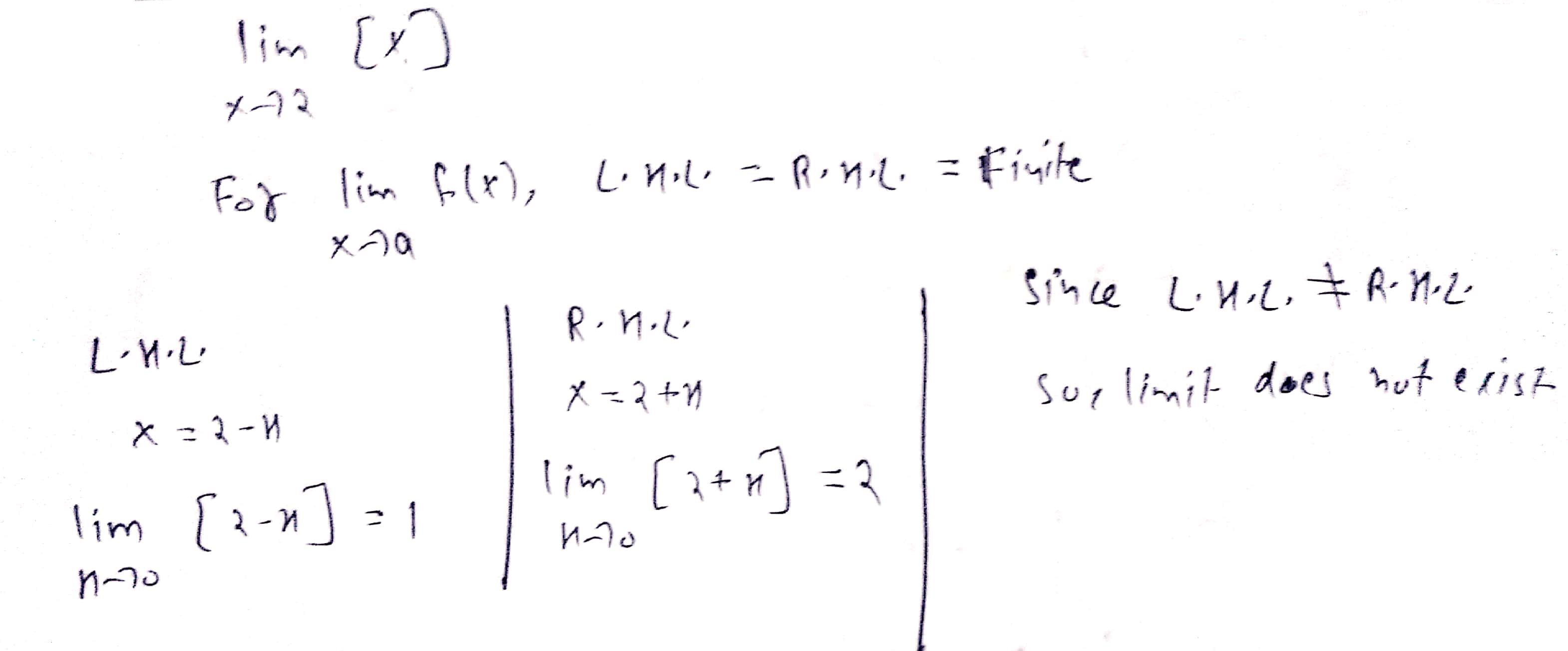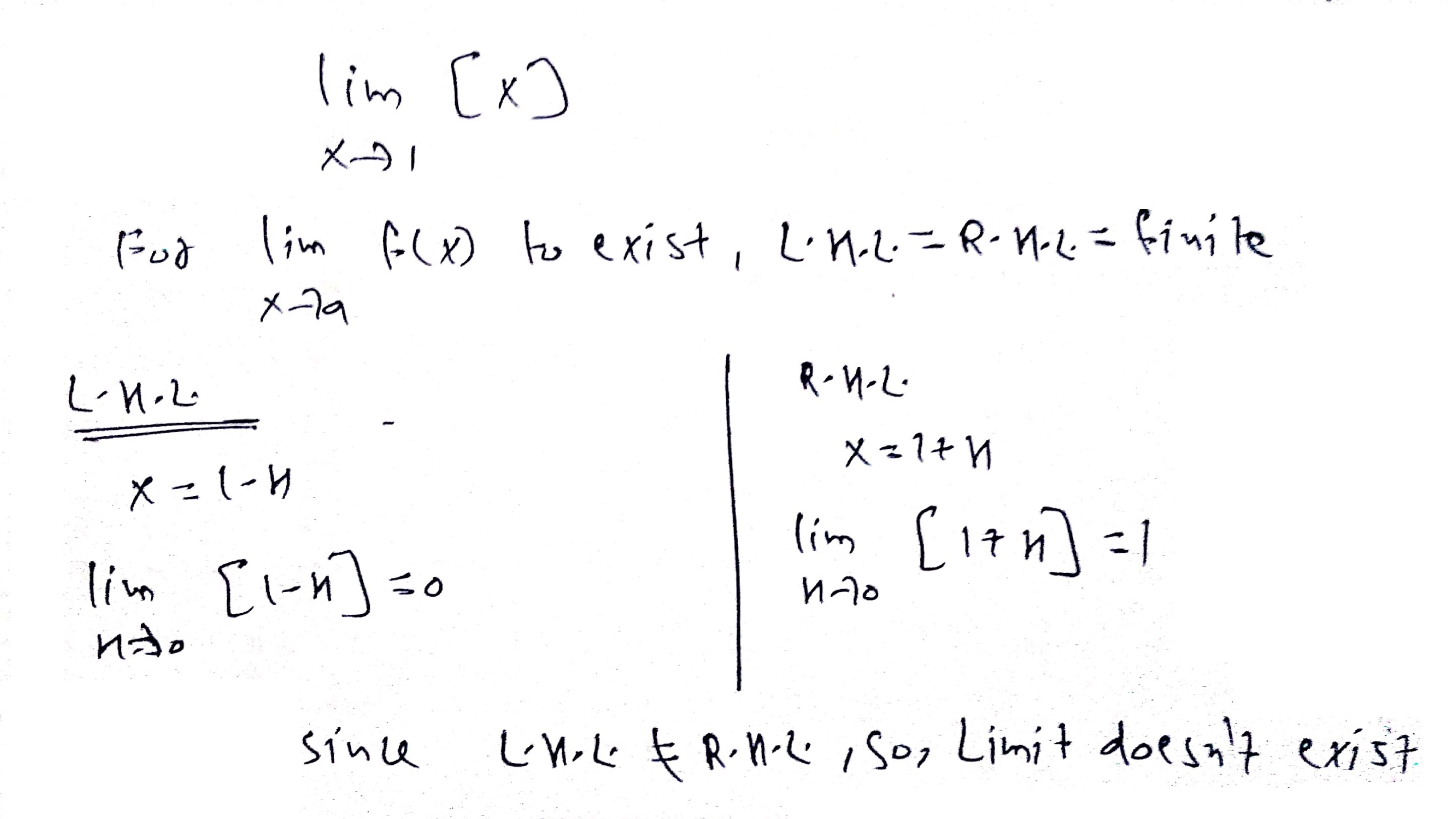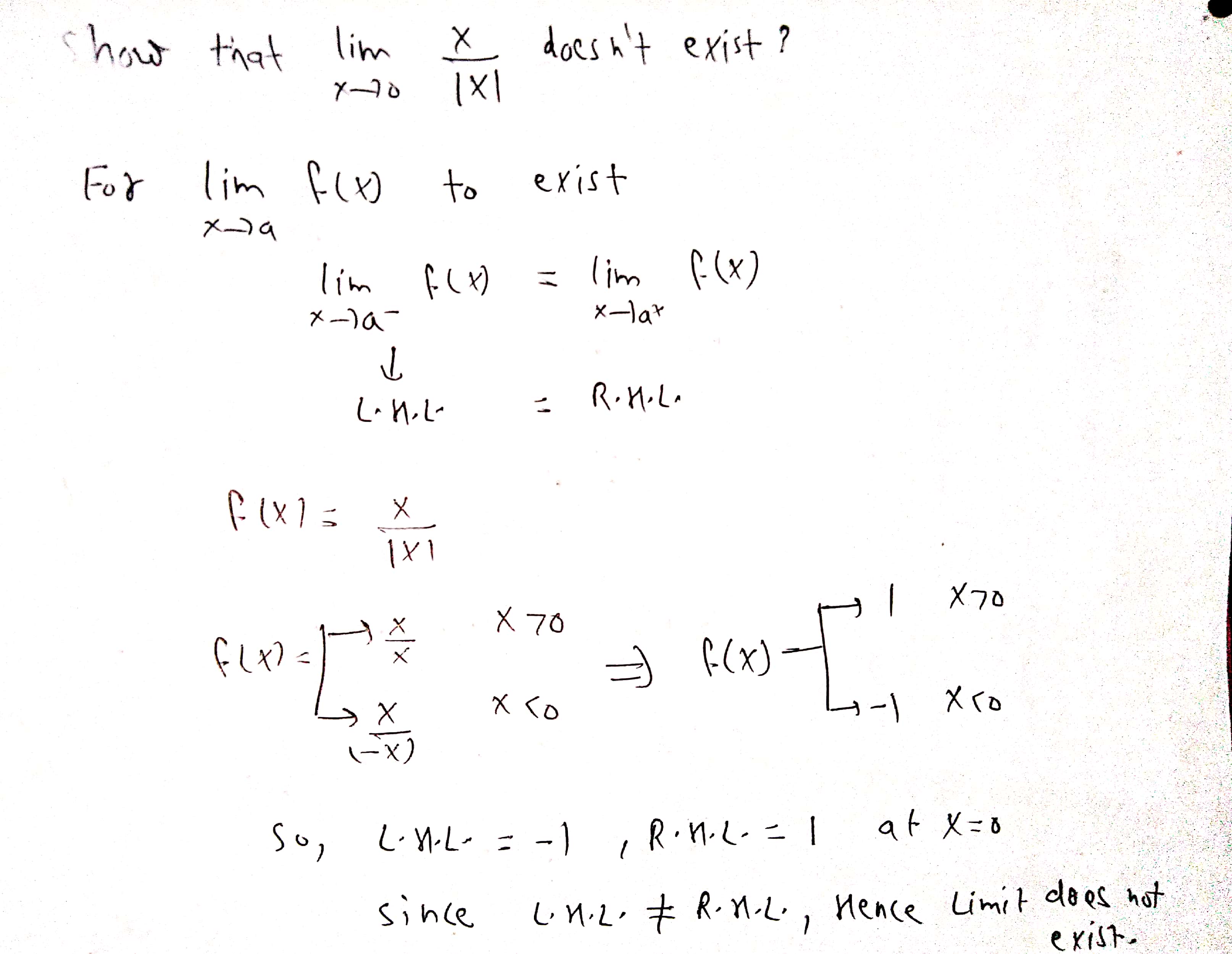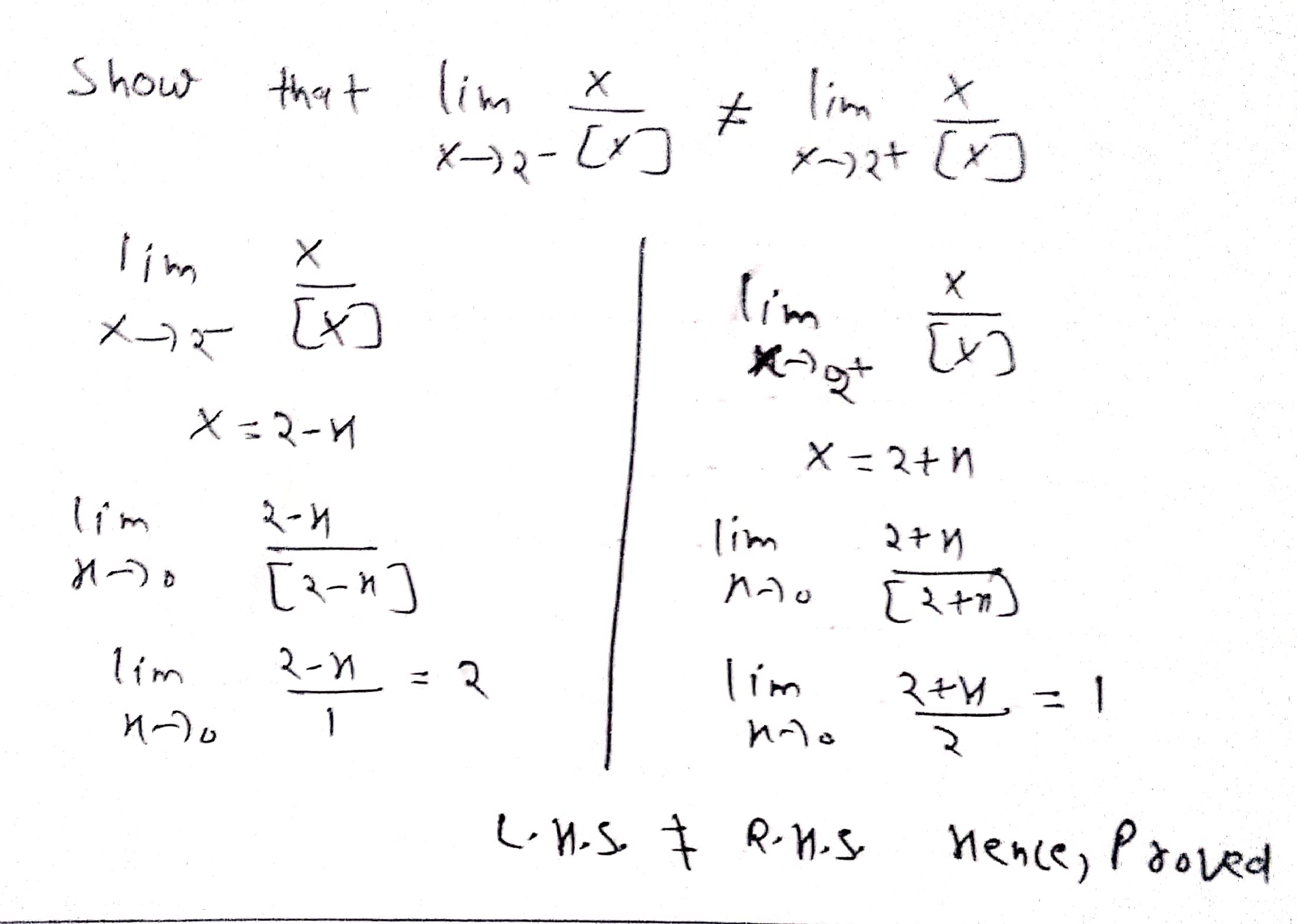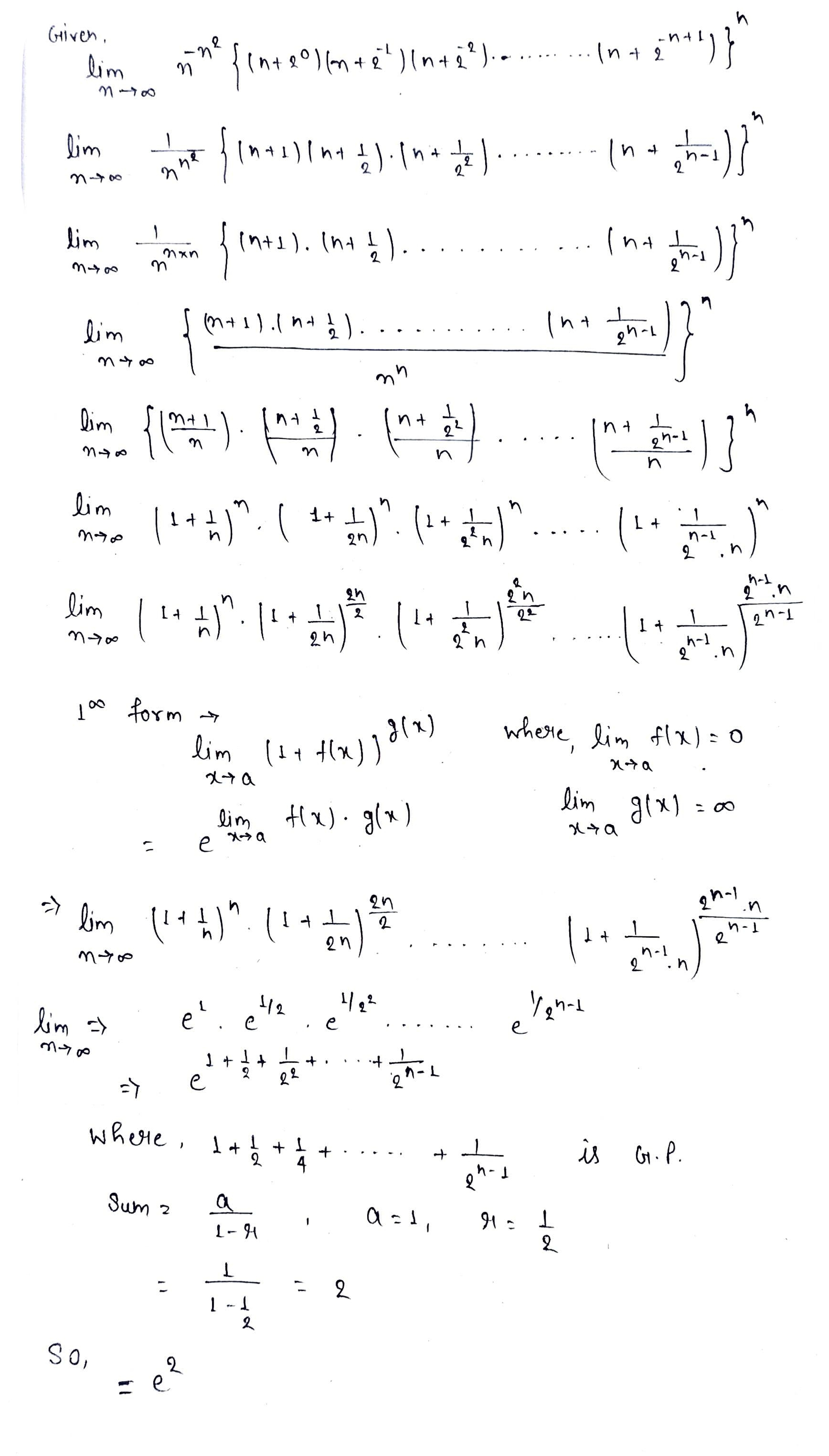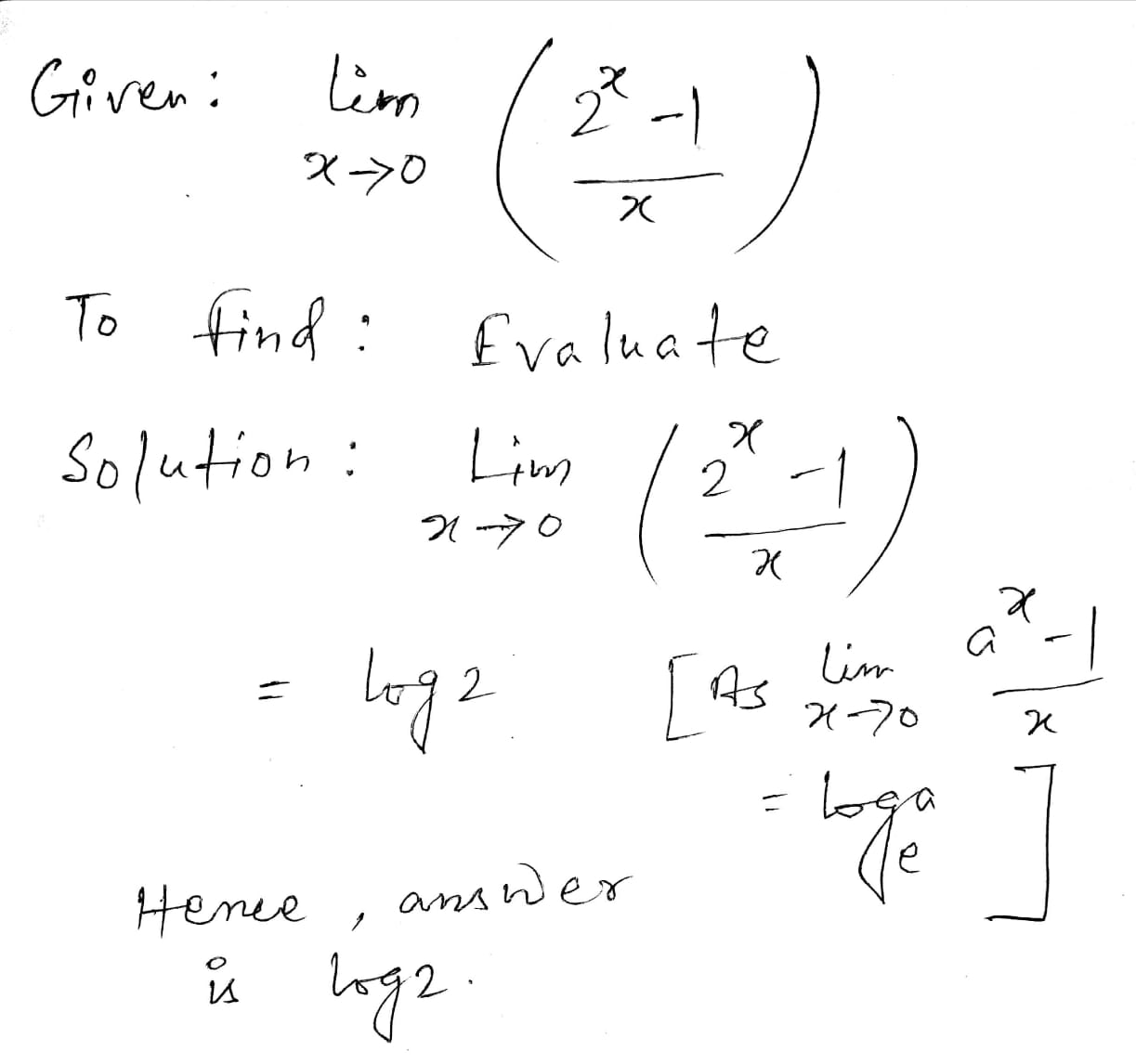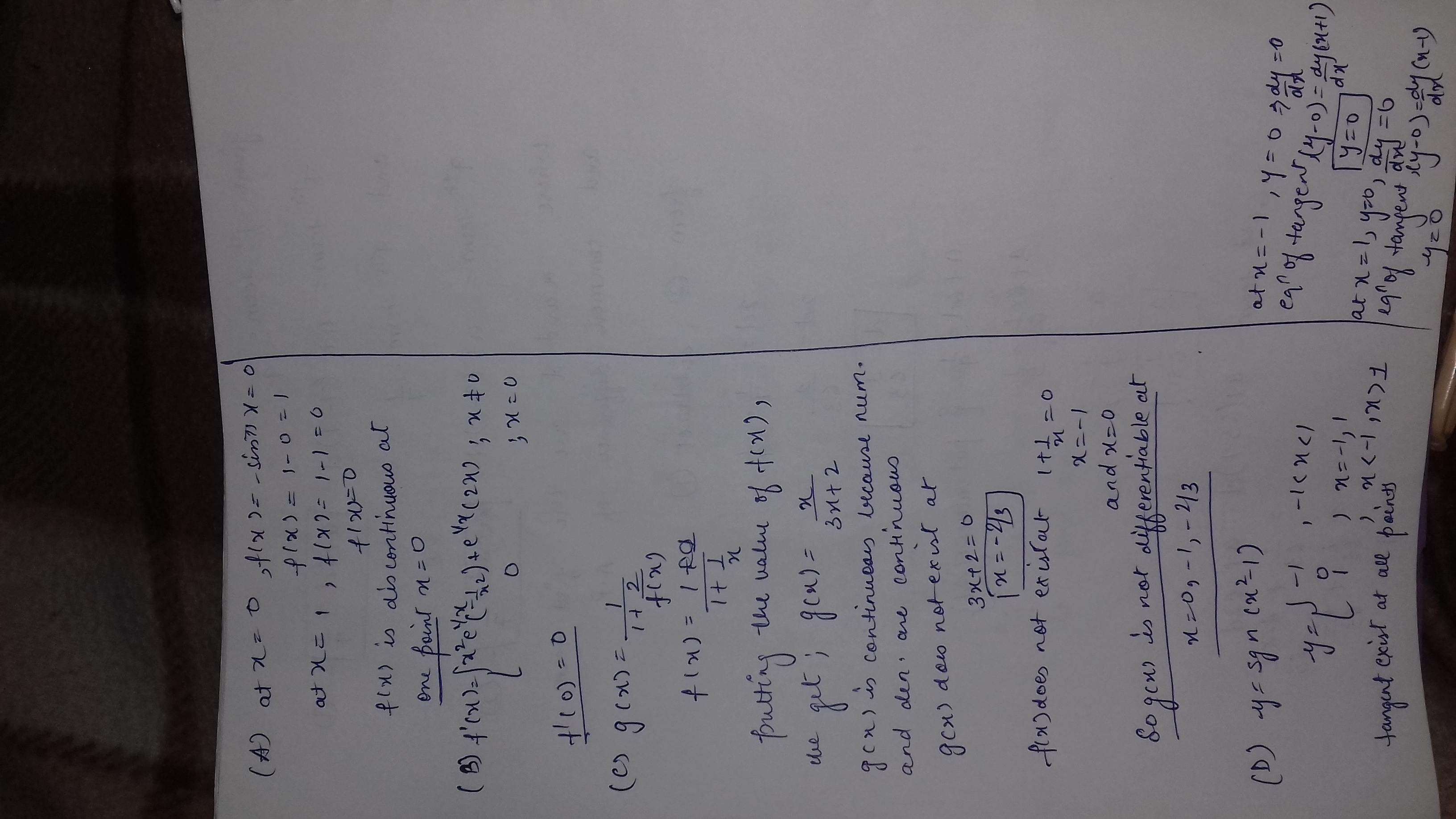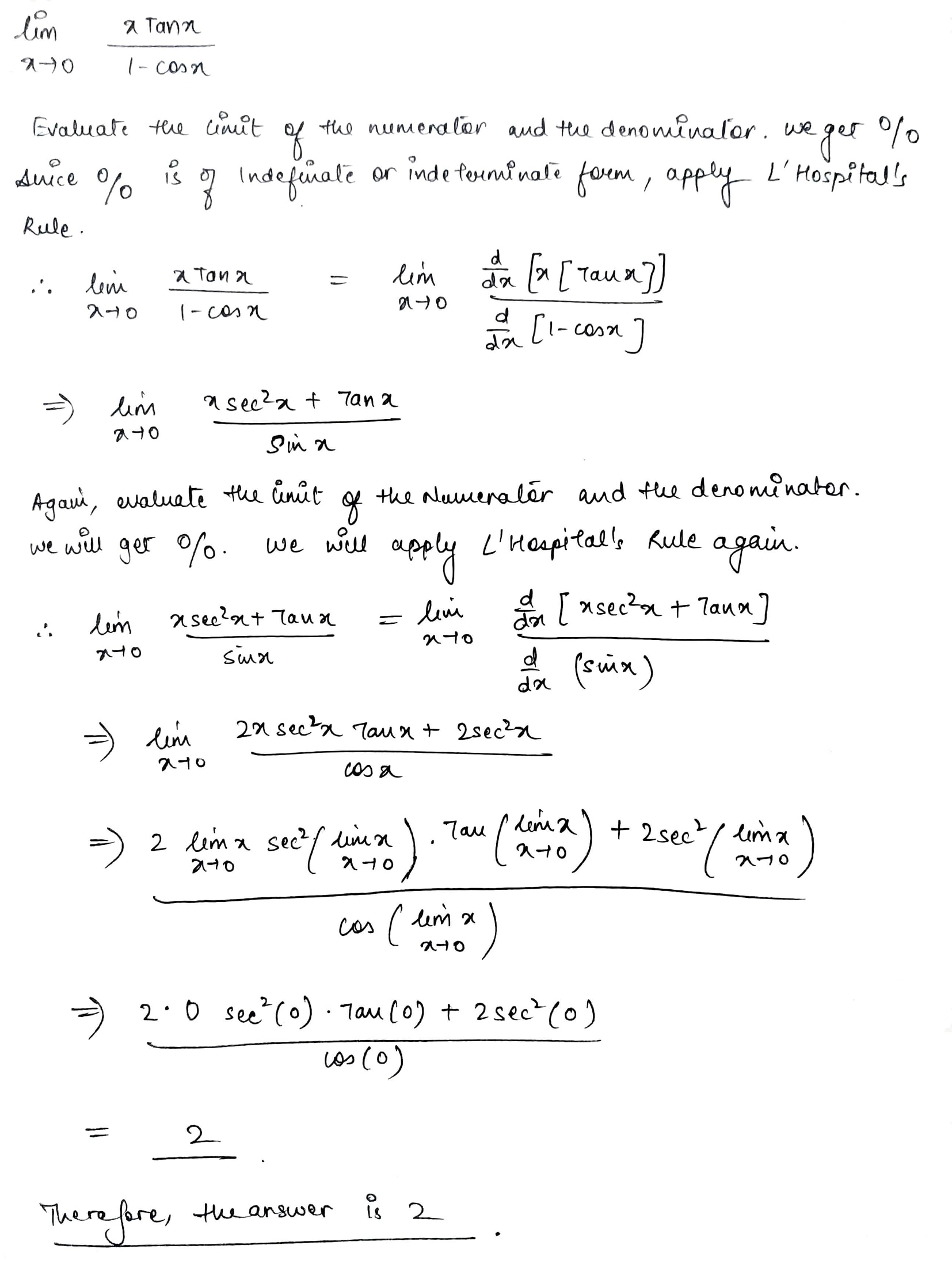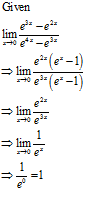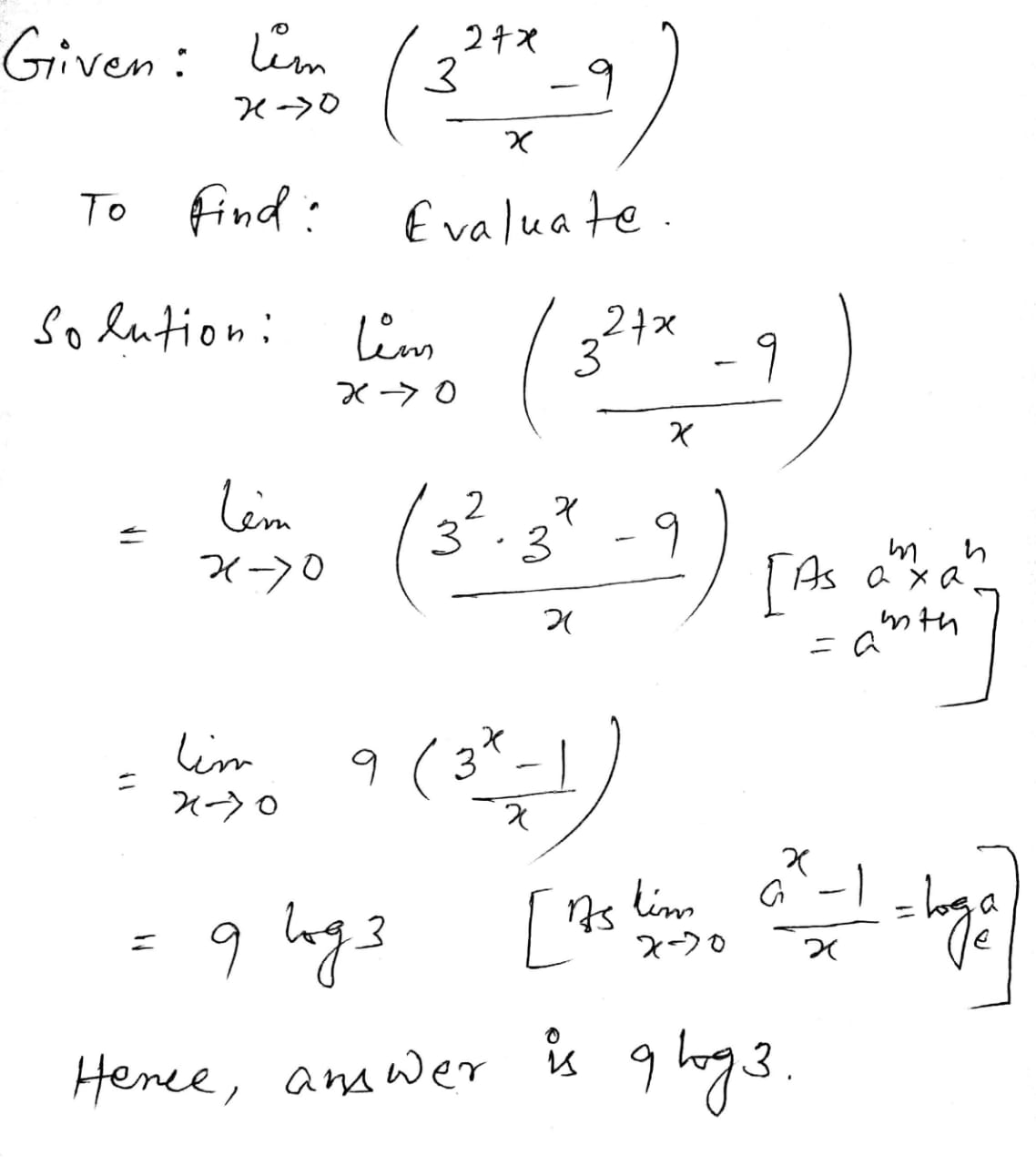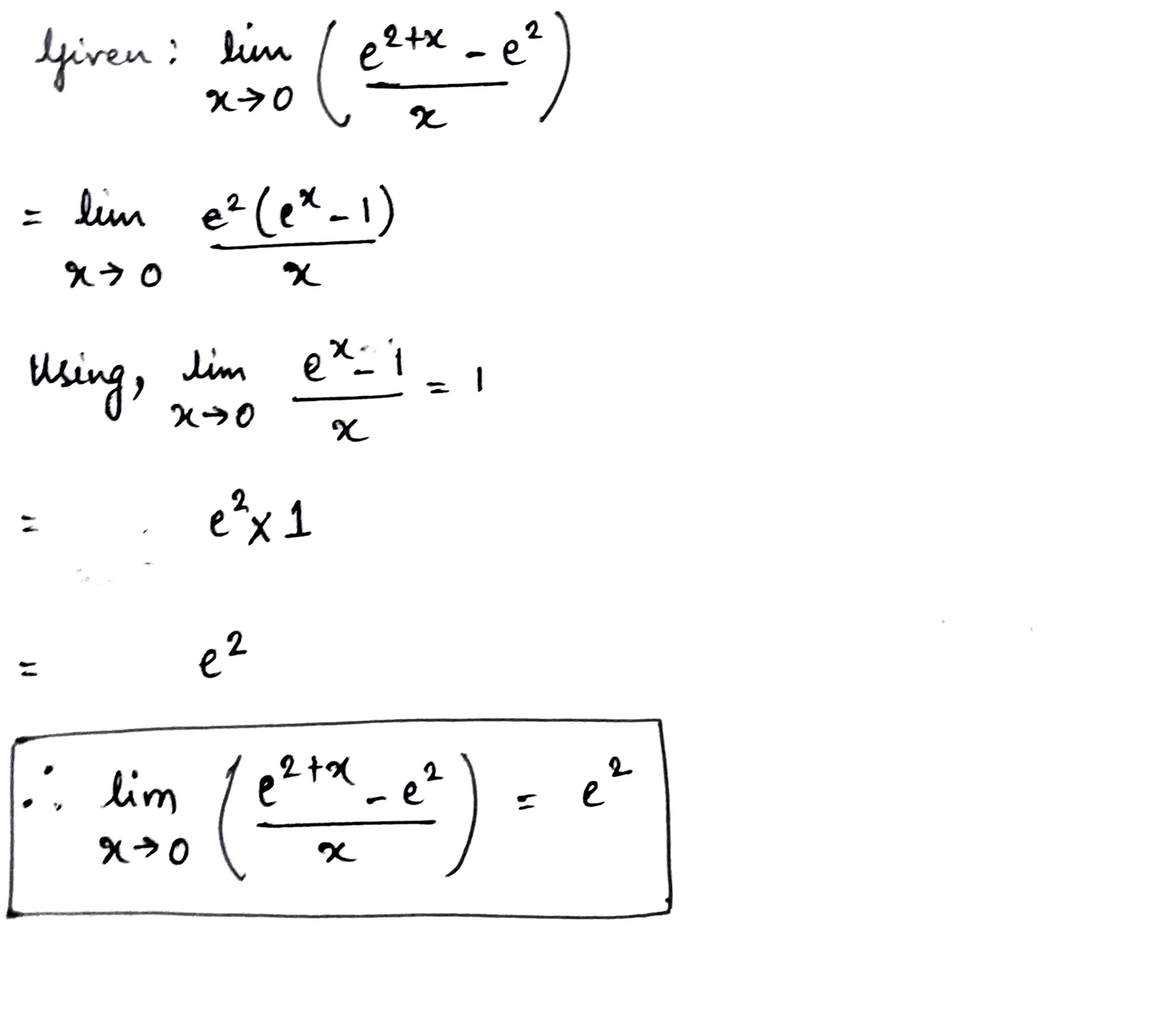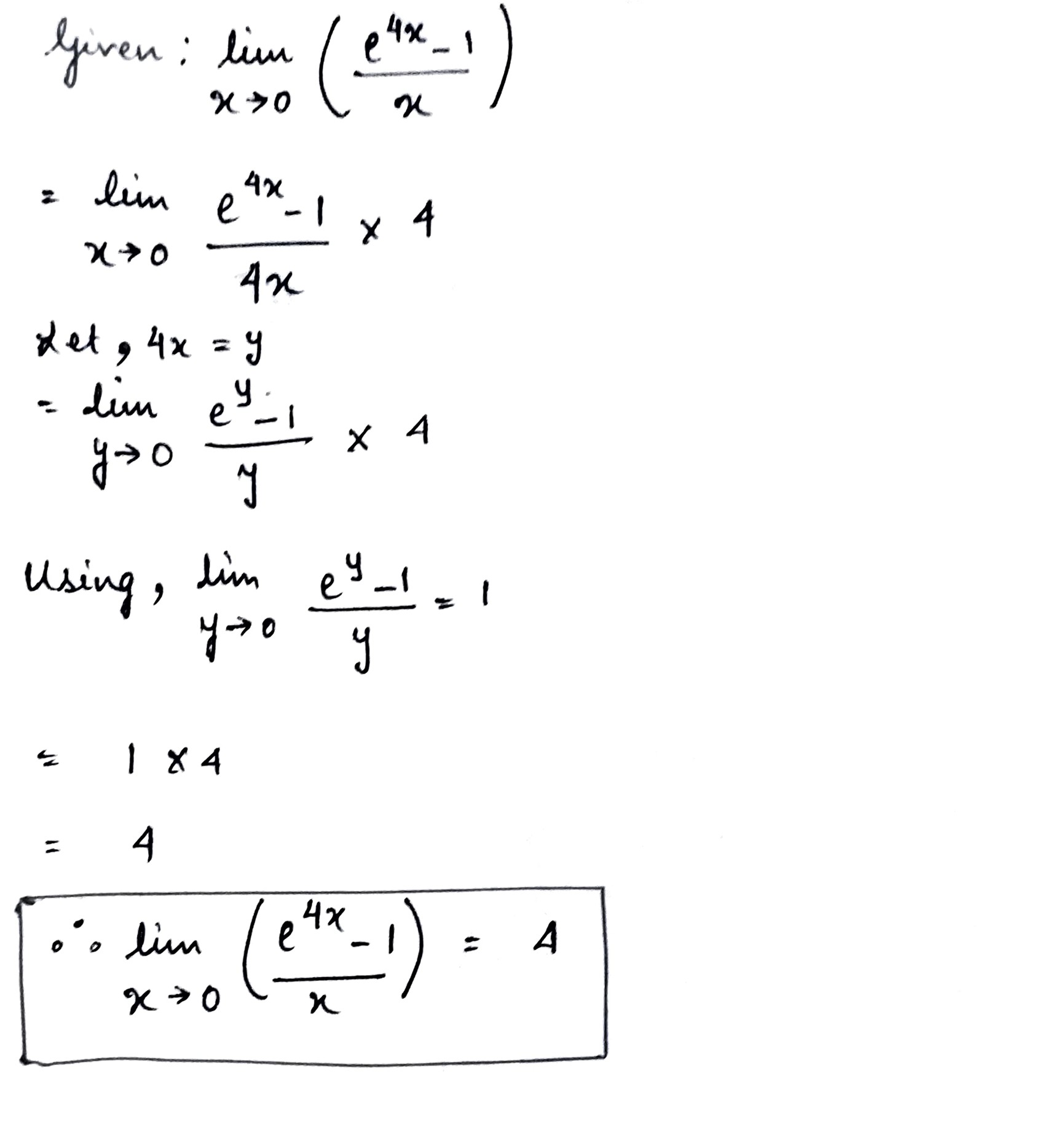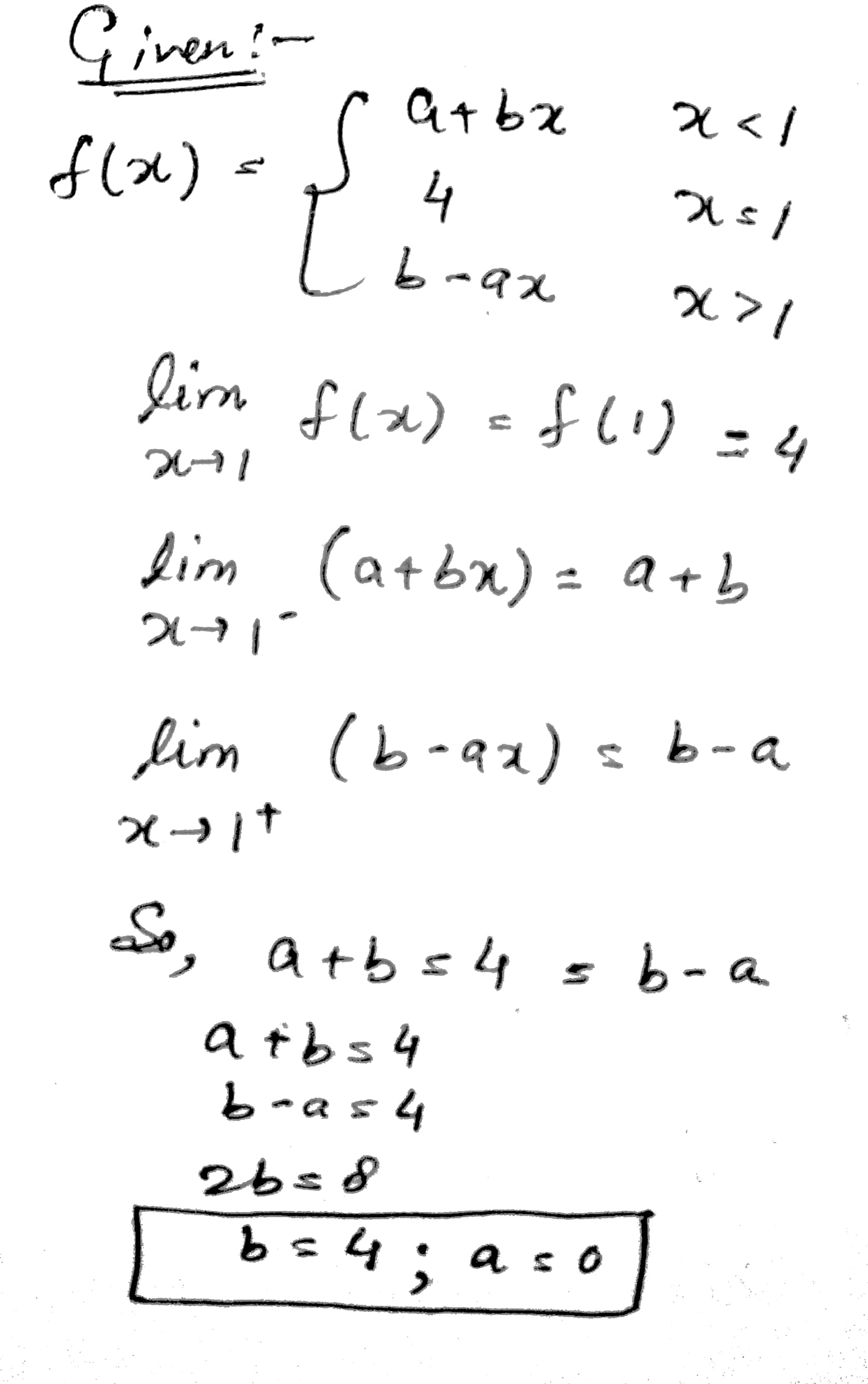Limits And Continuity - Class 11 Commerce Applied Mathematics - Extra Questions
Evaluate the given limit: limx→0xsecx
limx→0−|x|x=−1
Show that limx→0+|x|x=1
f(x)=x−1|x−1|2
Find both right and left hand limit of limit is exist at x=1
limx→∞(1+2x1+3x)x
limx→0e2x−1sin3x=
If f(x)=tanxx−π, thenlimx→πf(x)=?
limx→πf(x)=?
limx→∞(1+1x)2x
Ltx→0x√1+x−1
Evaluate limx→0logx+log1+xxx
limx→04√9−x+x2−3
limx→0log(3+x)−log(3−x)x
Solve:
limx→03sin2x−2sinx23x2
limx→a(x+12x+1)x2=
limx→3x2−x−6x3−3x2+x−3
The value of xlim→∞xsinπ4xcosπ4x
Evaluate limx→2x5−32x3−8
limx→1n√x−1m√x−1 ( m and n integers) is equal to
Evaluate: limx→−2x5+32x3+8
limx→ax7−a7x−a
Evaluate: limx→0(1+x)6−1(1+x)5−1
Evaluate limx→−2tanπxx+2
Prove that limx→0(ex−1x)=1
Evaluate limx→0xtan4x1−cos4x
The value of limh→0e2h−1h
ltx→∞ex2−1ex2+1=
limx→π/33tanx−tan3xcos(x+π6) is equal to
The value limx→tan−13tan6x−2tan5x−3tan4xtan2x−4tanx+3 is
Prove that the derivative of an odd function is always an even function.
Evaluate the Given limit: limx→0sinaxsinbx,a,b≠0
Evaluate the given limit: limx→0cos2x−1cosx−1
Find the value of \displaystyle \lim_{x\rightarrow \frac{\pi }{2}}\frac{\tan 2x}{x-\frac{\pi }{2}}
Evaluate the given limit: \displaystyle \lim_{x\rightarrow 0}\frac{ax+x\,\cos \,x}{b\,\sin \,x}
\lim_{x \rightarrow a} \dfrac{x cos a - a cos x}{x - a}
Find: \displaystyle\lim_{n\rightarrow \infty}\displaystyle\sum^{n}_{r=1}=\frac{1}{16r^2+8r-3}.
Calculate the following limits.
\displaystyle \lim_{x \, \rightarrow \, 0} \, \frac{sin \, 3x}{2x}.
Find the following limit.
\displaystyle \lim_{x \, \rightarrow \, 0 } \, \frac{\cos \, (x/2) \, - \, \sin \, (x/2)}{\cos \, x}.
Solve \lim _{ x\rightarrow 2 }{ (\dfrac { { x }^{ 5 }-32 }{ { x }^{ 3 }-8 } ) }
Solve \lim _{ x\rightarrow 0 }{ \dfrac { \cos { x } -\cot { x } }{ x } }
Apply the lmitsto given expression \displaystyle\lim_{x\rightarrow 0}\left(\left((x+1)(x+2)(x+3)(x+4)\right)^{\dfrac{1}{4}}-x\right).
Solve: \displaystyle \lim_{ n\rightarrow\infty} \dfrac{\Sigma n^2 \, \Sigma n^3}{\Sigma n^6} =? If your answer is in the form \dfrac{p}{q} ,then find |p-q|.
\displaystyle\lim_{x\rightarrow 0}\dfrac{x\tan 2x-2x\tan x}{(1-\cos 2x)^2} equals?
Evaluate: \mathop {\lim }\limits_{x \to 3} \left[ {\dfrac{1}{{x - 3}} + \dfrac{{9x}}{{27 - {x^3}}}} \right]
The value of \displaystyle \underset{x\to \infty }{\mathop{\lim }}\,\left( x\sin \left( \dfrac{3}{x} \right) \right)
If \displaystyle \lim_{x\rightarrow 0} \dfrac {\sin \sqrt {x}}{\sqrt [4]{x}}.
Evaluate \lim_{x\rightarrow 1}\frac{x^{15}-1}{x^{10}-1}
Solve: \underset{x \rightarrow 2}{\lim} \dfrac{a^{\tan x} - a^{\sin x}}{\tan x - \sin x}, a > 0
Evaluate:\mathop {\lim }\limits_{x \to 0} \left( {{{\left( {x + 1} \right)}^{\frac{2}{3}}} - {{\left( {x - 1} \right)}^{\frac{2}{3}}}} \right)
Solve \mathop {\lim }\limits_{x \to \frac{\pi }{4}} \dfrac{{f\left( x \right) - f\left( {\dfrac{\pi }{4}} \right)}}{{x - \dfrac{\pi }{4}}}, where f\left( x \right) = \sin 2x
Evaluate the limit
\mathop {\lim }\limits_{x \to \frac{\pi }{6}} \frac{{{{\cot }^2}x - 3}}{{\cos ecx - 2}}
Evaluate:
\mathop {\lim }\limits_{x \to 0} \frac{{\sqrt {1 + \sin x} - \sqrt {1 - \sin x} }}{x}
Evaluate:\lim\limits_{x\to 0}\dfrac{\sqrt{1+x}-1}{\log(1+x)}
Prove that
L = \lim _ { n \rightarrow \infty } \left( 1 + \frac { 4 } { n } \right) ^ { 3 n } = 12
Evaluate: \lim _ { x \rightarrow 1 } \frac { ( \ln ( 1 + x ) - \ln 2 ) \left( 3.4 ^ { x - 1 } - 3 x \right) } { \left[ ( 7 + x ) ^ { \frac { 1 } { 3 } } - ( 1 + 3 x ) ^ { \frac { 1 } { 2 } } \right] \cdot \sin ( x - 1 ) }
Evaluate \displaystyle \lim_{x\rightarrow \pi/2} \dfrac {1 + \cos 2x}{(\pi - 2x)^{2}}.
\mathop {\lim }\limits_{x \to \tfrac{\pi }{2}} (secx - tanx)
Solve: \underset{x \rightarrow 2}{lim} \dfrac{x^5 - 32}{x^2 - 4}.
If \underset { x\rightarrow a }{ lim } \frac { 2x-\sqrt { { x }^{ 2 }+{ 3a }^{ 2 } } }{ \sqrt { x+a } -\sqrt { 2a } } =\sqrt { 2 } (where a\in { R }^{ + }) then a is equal to
Solve
\lim_{x \rightarrow \infty} \dfrac{1}{(1-x)^{2}}
\mathop {\lim }\limits_{x \to 0} \dfrac{{\cos x}}{{\pi - x}}
\lim _{ x\rightarrow 2 }{ \frac { { x }^{ 7 }-128 }{ { x }^{ 5 }-32 } }
Prove that every rational function is a continuous.
\lim\limits_{x-\infty }\dfrac{\cos x+\sin^{2}x}{x+1}
Evaluate \displaystyle \lim_{x \rightarrow -2^{+}}\dfrac{x^{2}-1}{2x+4}.
\displaystyle \lim _{ x\rightarrow 0 } \dfrac{x^{3}+3x^{2}-9x-2}{x^{3}-x-6}
\underset { x\rightarrow 0 }{ lim } \frac { sin(2+x)-sin(2-x) }{ x }
Evaluate
\underset { h\rightarrow 0 }{ lim } \dfrac { \left( a+h \right) ^{ 2 }sin(a+h)-{ a }^{ 2 }sina }{ h }
Solve:\lim_{x\rightarrow 0}\cfrac{(1-\cos 3x)}{x\sin 2x}
Evaluate:\displaystyle {\lim}_{x\rightarrow 0}{\dfrac{{\sin}^{2}{2x}}{{\sin}^{2}{4x}}}
Evaluate \displaystyle\lim_{x\to 3} \left(\dfrac{x^4-81}{2x^2-5x-3}\right)
Evaluate:\displaystyle \lim_{x\rightarrow 0}\cos x \cot 2x
Using the \in -\delta definition prove that \underset { x\rightarrow 3 }{ lim } \left( { x }^{ 2 }+2x-8 \right) =7
Using the \in -\delta definition prove that \underset { x\rightarrow -2 }{ lim } \left( 3x+8 \right) =2
Evaluate : \underset { h\rightarrow 0 }{ lim } \dfrac { { log }_{ a }(x+h)-{ log }_{ a }x }{ h }
Find \displaystyle\lim_{x\rightarrow 1^+}\dfrac{1}{x-1}.
Find \displaystyle\lim_{x\rightarrow 2}[x].
Find \displaystyle\lim_{x\rightarrow 1}[x].
Show that \displaystyle\lim_{x\rightarrow 0}\dfrac{1}{x} does not exist.
If \displaystyle\lim_{x\rightarrow 0^+}\dfrac{2}{x^{1/5}}=a then \dfrac1a is equal to____.
If \displaystyle\lim_{x\rightarrow 0^+}\dfrac{1}{3x}=a then \dfrac {1} a is equal to____.
If \displaystyle\lim_{x\rightarrow -8^+}\dfrac{2x}{x+8}=a then \dfrac1a is equal to____.
Show that \displaystyle\lim_{x\rightarrow 0}\dfrac{x}{|x|} does not exist.
Solve: \displaystyle\lim_{h\rightarrow 0}\dfrac{\sqrt{x+h}-\sqrt{x}}{h}, x\neq 0.
Find \displaystyle\lim_{x\rightarrow \tfrac{5}{2}}[x].
Show that \displaystyle\lim_{x\rightarrow 2^-}\dfrac{x}{[x]}\neq \displaystyle\lim_{x\rightarrow 2^+}\dfrac{x}{[x]}.
Evaluate the following limits.
\displaystyle\lim_{x\rightarrow 1}\dfrac{x^2+1}{x+1}.
State Yes or No.\displaystyle\lim_{x\rightarrow 3^+}\dfrac{x}{[x]} is equal to \displaystyle\lim_{x\rightarrow 3^-}\dfrac{x}{[x]}.
Find \displaystyle\lim_{x\rightarrow -5/2}[x].
Evaluate the following limit.
\displaystyle\lim_{n\rightarrow 4}\left(n^2\sqrt n\right).
Evaluate the following limits.
\displaystyle\lim_{n\rightarrow 2}\sqrt {x+2}\sqrt x
Evaluate the following limits :
\displaystyle \lim_{x\to 2}\left(\dfrac {3^x +3^{3-x}-12}{3^{3-x}-3^{x/2}}\right)
Evaluate the following limits :
\displaystyle \lim_{x\to 0}\left(\dfrac {a^x - b^x}{x}\right)
Evaluate the following limits :
\displaystyle \lim_{x\to 0}\left(\dfrac {a^x -a^{-x}}{x}\right)
Evaluate the following limits :
\displaystyle \lim_{x\to 0}\left(\dfrac {e^x -x-1}{x}\right)
Evaluate the following limits :
\displaystyle \lim_{x\to 0}\left(\dfrac {e^{bx}-e^{ax}}{x}\right), 0 < a < b
Evaluate the following limits :
\displaystyle \lim_{x\to 4}\left(\dfrac {e^x -e^4}{x-4}\right)
Evaluate the following limits :
\displaystyle \lim_{x\to 0}\left(\dfrac {e^{3x}-e^{2x}}{x}\right)
Evaluate lim_{ n \to \infty} n ^{-n^2}\left\{( n + 2^{o})(n + 2^{-1})(n + 2^{-2})....(n + 2^{-n + 1})\right\}^n
Evaluate the following limits :
\displaystyle \lim_{x\to 0}\left(\dfrac {2^x -1}{x}\right)
Find the limits of
\dfrac{ 1 -x + \log x}{1 - \sqrt{2x - x^2}} , when x = 1 .
\displaystyle \lim _{x \rightarrow 0}\left(\dfrac{1+5 x^{2}}{1+3 x^{2}}\right)^{1 / x^{2}}= ___________
The value of \displaystyle \lim _{x \rightarrow \infty} \dfrac{\log _{e}\left(\log _{e} x\right)}{e^{\sqrt{x}}} is
Let \displaystyle \lim_{T\infty} \dfrac{1}{T} \displaystyle \int_{0}^{T} (sinx + sin ax)^2dx=L ,then
\displaystyle \lim_{x \to -\infty} \left[\dfrac{x^4 \sin \left(\dfrac{1}{x}\right)+x^2}{\left(1+|x|^3\right)}\right]=_____________
Evaluate \displaystyle \lim_{x\rightarrow \infty} 2^{x} \sin \left (\dfrac {a}{2^{x}}\right ).
Evaluate \displaystyle \lim_{x\rightarrow 1}\dfrac {e^{x} - e^{-x}}{e^{x} + e^{-x}}.
\displaystyle \lim_{x\rightarrow 0}\dfrac {ae^{x} - b\cos x + ce^{-x}}{x\sin x} = 2, then find the value of a, b and c.
\lim_{x \rightarrow a} \frac{\sqrt[m]{x}-\sqrt[m]{a}}{x-a}
The value of \mathrm{f}(0) such \displaystyle \mathrm{f}(\mathrm{x})=\frac{1-\cos^{2}\mathrm{x}+\sin^{2}\mathrm{x}}{\sqrt{\mathrm{x}^{2}+1}-1}(\mathrm{x}\neq 0) is continuous at \mathrm{x}=0 is
If f(x) =\displaystyle \frac{a\sin x -bx +cx^2+ x^3}{2x^2 \ell n(1+ x)- 2x^3+ x^4}, when x\neq 0 and f(x) is continuous at x = 0, find value of 200\times f(0)
\displaystyle \Delta (x)=\begin{vmatrix} \tan x & \tan (x+h) & \tan (x+2h) \\ \tan (x+2h) & \tan x & \tan (x+h) \\ \tan (x+h) & \tan (x+2h) & \tan x \end{vmatrix}
Find the value of \displaystyle \lim_{h\rightarrow 0}\frac{\sqrt{3}\Delta (\pi /3)}{h^{2}}
Match the entries in Column I with entries in Column II
Calculate the following limits.
\displaystyle \lim_{n \, \rightarrow \, \infty} \, \frac{5^{n \, + \, 1} \, + \, 3^n \, - \, 2^{2n}}{5^n \, + \, 2^n \, + \, 3^{n \, + \, 2}}, \, n \, \epsilon \, N.
Calculate the following limits.
\displaystyle \lim_{x \, \rightarrow \, 0} \, \frac{\cos \, 4x \, - \, cos \, 6x}{\sin^2 \, 5x}.
Solve:
\lim_{x\rightarrow 0}\dfrac{x\sqrt{y^2-(y-x)^2}}{\left \{ \sqrt{(8xy-4x^2)}+\sqrt{8xy} \right \}^3}
evaluate
\underset { x\rightarrow 0 }{ lim } \dfrac { x\tan x }{ \left( 1-\cos x \right) }
Evaluate:\lim_{x\rightarrow 0}\dfrac{e^{3x}-e^{2x}}{e^{4x}-e^{3x}}
Evaluate the following limits :
\displaystyle \lim_{x\to 0}\left(\dfrac {3^{2+x}-9}{x}\right)
Find absolute maximum and minimum values of a function f given by f(x)=12x^{4/3}-6x^{1/3}, x\in [-1, 1].
Evaluate the following limits :
\displaystyle \lim_{x\to 0}\left(\dfrac {e^{2+x}-e^2}{x}\right)
Evaluate the following limits :
\displaystyle \lim_{x\to 0}\left(\dfrac {e^{4x}-1}{x}\right)
Suppose F ( x ) \left\{ \begin{array} { c l } { a + b x , } & { x _ { c 1 } } \\ { 4 , } & { x = 1 } \\ { b - a x , } & { x > 1 } \end{array} \right. and \lim f ( x ) \cdot f ( x ) What are the possible values of a and b?
Class 11 Commerce Applied Mathematics Extra Questions
- Basics Of Financial Mathematics Extra Questions
- Circles Extra Questions
- Descriptive Statistics Extra Questions
- Differentiation Extra Questions
- Functions Extra Questions
- Limits And Continuity Extra Questions
- Logarithm And Antilogarithm Extra Questions
- Mathematical And Logical Reasoning Extra Questions
- Number Theory Extra Questions
- Numerical Applications Extra Questions
- Permutations And Combinations Extra Questions
- Probability Extra Questions
- Relations Extra Questions
- Sequences And Series Extra Questions
- Set Theory Extra Questions
- Straight Lines Extra Questions
- Tangents And Its Equations Extra Questions
